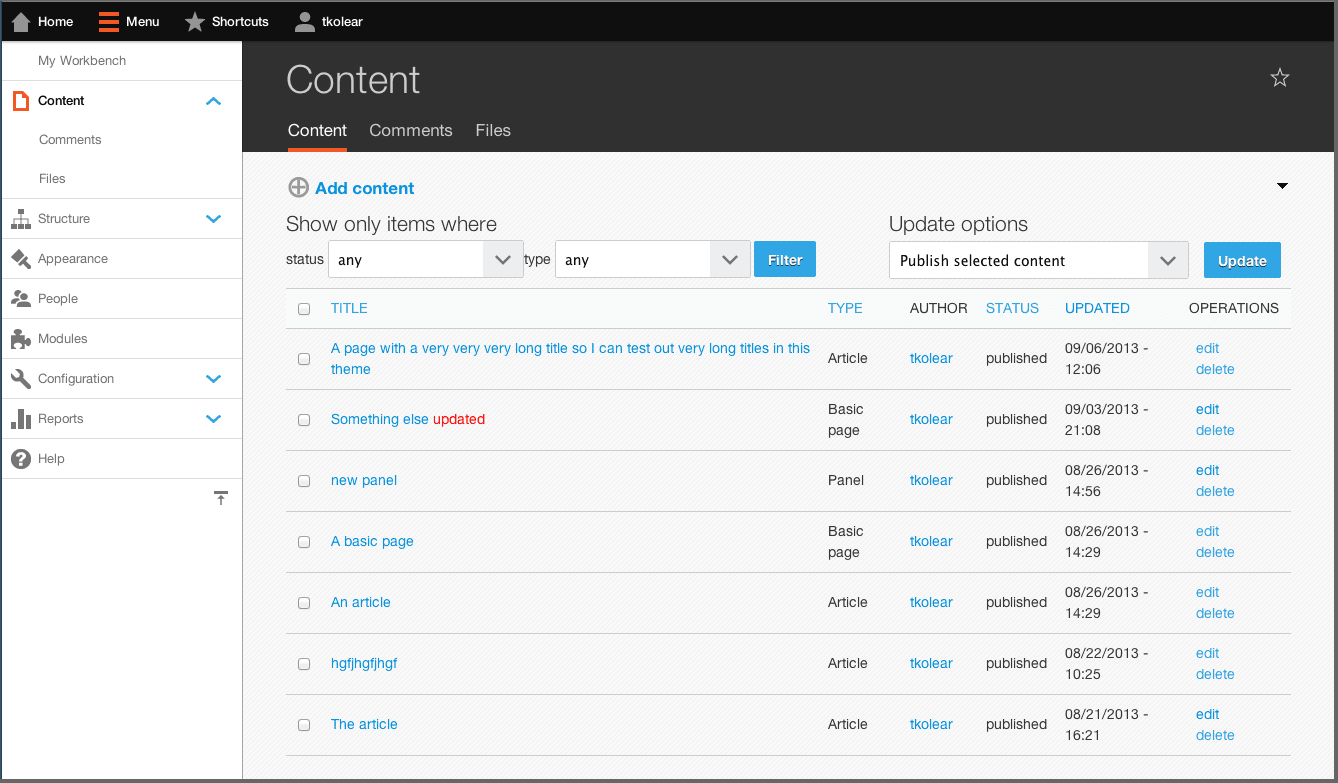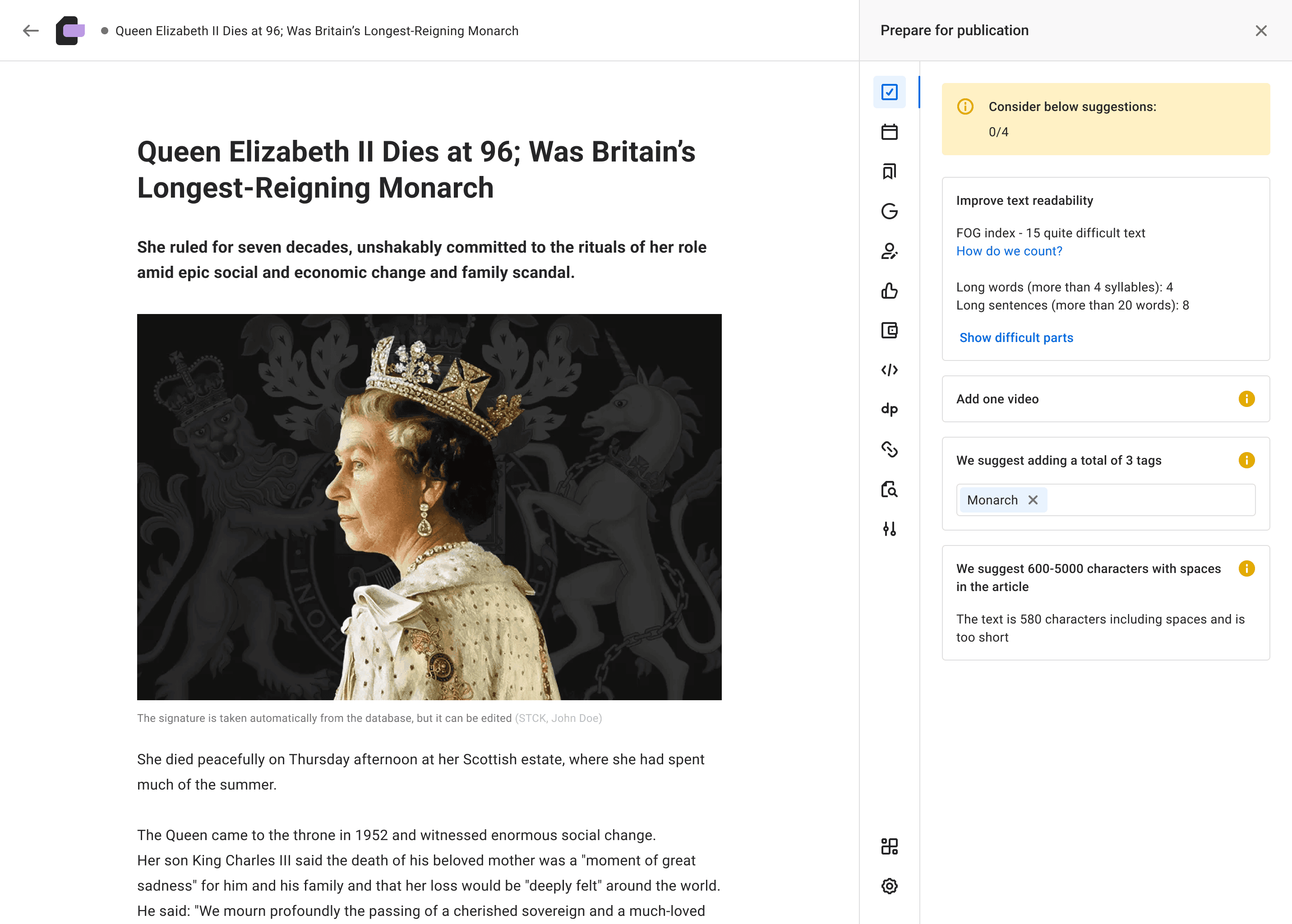Top CMS platforms tailored to journalists, newsrooms and editorial teams
1 Jul 2023
Choosing the right CMS platform is crucial to optimising your online presence (image generated by Midjourney)
To help you make an informed choice, we have compiled a list of the best CMS solutions that enable editorial teams to deliver impactful stories seamlessly. Join us on this journey learn advantages of bespoke CMS and a ready-made CMS solutions.
Choosing the right CMS platform is crucial to optimising your online presence and reaching a wider audience. This article will introduce you to some of the best CMS platforms and give you the knowledge you need to make an informed decision and drive your journalistic efforts in the digital age.
Take a look at a CMS we developed for one of the largest Tech&Media holdings in Central Europe
WordPress
Wordpress is often hailed as the "go-to" CMS for journalists and for good reason. With its user-friendly interface, robust feature set and extensive library of plugins and themes, WordPress has earned its reputation as a versatile workhorse for content creators, including journalists.
1. User-friendly interface
Even with minimal technical knowledge, you can quickly get up and running with WordPress. The dashboard provides easy access to all the essential tools you need to create and manage your content. Whether you're writing articles, uploading images or embedding multimedia, WordPress simplifies the process and allows you to focus on what matters most — your stories.
2. Extensive plugin ecosystem
WordPress has an extensive ecosystem of plugins, i.e. add-on modules that extend the functionality of your website. For journalists, this means you can easily integrate tools for SEO optimisation, social media sharing, analytics and more. Special plugins also optimise editorial workflows, making it easier to collaborate with editors and manage content changes.
3. Multimedia storytelling
Multimedia elements such as images, videos and interactive graphics are essential to engaging storytelling. WordPress excels in this regard, offering seamless integration of multimedia content. Whether embedding YouTube videos, creating captivating image galleries or incorporating interactive maps, WordPress provides the tools to bring your stories to life.
Watch: An AI-powered feature that limits the number of stock pictures used and helps illustrate abstract topics. A user inputs a description and style preferences, and the AI generates images that align with the article's content.
4. SEO-friendly
Search engine optimisation (SEO) is essential for journalists who want to reach a wider audience. WordPress is inherently SEO-friendly and offers features that allow you to quickly optimise your content for search engines. In addition, various SEO plugins are available to help you fine-tune your articles, meta tags and schema markup to improve your website's visibility on search engine results pages.
5. Scalability
WordPress is highly scalable and suitable for individual journalists and large news organisations. WordPress can adapt to your needs whether you run a personal blog or a media organisation with a large readership. The scalability ensures that your website can grow as your journalistic career progresses.
Read also: How to choose a text editor for a digital-first newsroom?
Joomla
Even though WordPress is the most popular CMS, Joomla is a serious contender, especially for journalists and media professionals looking for a robust and scalable solution. Joomla's unique blend of advanced customisation options and content organisation tools sets it apart.
1. Advanced customisation options
The template system of Joomla allows you to create unique and visually appealing layouts, ensuring your website stands out in a crowded digital space. Whether you want to create a simple blog or a complex news portal, Joomla offers the flexibility to customise your website to your needs.
2. Content organisation
Joomla has a built-in hierarchical content structure that simplifies the organisation of articles, categories and tags. This structure is particularly beneficial for news websites covering a wide range of topics and ensuring that your readers can easily find and navigate your content.
Watch: An example of a bespoke CMS we built for Wirtualna Polska
3. Large editorial teams
Joomla is well suited to media organisations with large editorial teams. Its user management system allows you to define different roles and permissions for team members to ensure that only authorised people can publish and edit content. This feature improves collaboration and editorial control, which is critical to maintaining the quality and integrity of journalistic work.
4. Multilingual support
Joomla offers native support for multiple languages, making it an excellent choice for journalists and media organisations looking to expand their readership internationally. You can easily create content in multiple languages and provide a seamless experience to readers from different language backgrounds.
5. Extensions and add-ons
Just like WordPress, Joomla has a thriving marketplace for extensions. With these extensions, you can quickly add new features to your website. Whether you want to integrate social media feeds, implement e-commerce features or improve the security of your website, there are Joomla extensions to suit your needs.
6. Scalability
Joomla is designed to handle websites of varying sizes and complexity. It can accommodate the growth of your journalistic endeavours from a small blog to a full-fledged news portal with thousands of articles. Joomla's scalability ensures that your website can evolve with your journalistic ambitions.

Some CMS tools are designed to handle websites of varying sizes and complexity (image by Midjourney)
Drupal
When managing and presenting complex journalistic content, Drupal proves to be an absolute powerhouse. This CMS platform is prized for its ability to handle complicated reports, multiple content types and sophisticated editorial workflows.
1. Flexibility and adaptability
Drupal's main strength lies in its unparalleled flexibility. For journalists, this means they can design and structure their website exactly the way they want. Whether you're working on a data-intensive report, an interactive documentary or a multimedia narrative, Drupal's adaptable framework allows you to create a customised digital environment that perfectly fits your storytelling needs.
2. Data integration and analysis
Drupal is great for data integration and analysis, making it the first choice for journalists working on data-driven stories. It offers seamless integration with data visualisation tools that allow you to present complex information in a user-friendly way. In addition, robust API support enables connections with external databases and data sources.
6 pillars of editorial analytics at Mediahuis – with Yves Van Dooren
3. Editorial workflow control
Maintaining editorial integrity is paramount in journalism, especially when multiple people are involved. Drupal provides a sophisticated editorial workflow system that allows you to define roles, permissions and approval processes. This feature ensures that your content undergoes rigorous editorial review before publication, critical to maintaining accuracy and credibility.

A screenshot from Drupal CMS
4. Scalability for growth
Drupal is designed to handle busy websites with thousands of pages and complicated content hierarchies. As your journalistic efforts grow, Drupal can quickly scale to meet the needs of your growing audience. Scalability ensures that your website can handle the influx of visitors and add new content without sacrificing performance.
5. Taxonomy and content classification
Drupal's taxonomy system allows you to classify and categorise content precisely. Whether you organise articles by topic, location or date, Drupal provides a comprehensive taxonomy system that ensures your content is accessible for readers to find and navigate.
Read also: How to choose a text editor for a digital-first newsroom?
Ghost
While WordPress, Joomla and Drupal are robust and versatile CMS platforms, Ghost offers a different approach focusing on simplicity and a streamlined writing experience. Ghost is an attractive choice for journalists who value clean, distraction-free content creation and minimalist design.
1. Distraction-free writing
Ghost's user interface is designed to keep you focused on what matters most — writing. It provides a minimalist, distraction-free writing environment where you can focus entirely on your thoughts and ideas without being disturbed by superfluous menus and options. This simplicity fosters a creative and productive writing process.
2. Markdown editing
Ghost uses Markdown, a lightweight markup language, for content creation. This Markdown editor lets you quickly and intuitively format your text using simple symbols. For journalists, this means you can write and format your articles efficiently without extensive HTML knowledge.
3. Content-driven design
Ghost templates and themes put content first, making them an excellent choice for journalists who want their stories to take centre stage. The clear and elegant design ensures that your articles are presented in a visually appealing and reader-friendly way.
4. SEO-friendly
Ghost has been developed with the best SEO practices in mind, making optimising your content for search engines easy. You can focus on creating high-quality content while Ghost handles the technical SEO.
Watch: An AI feature that provides authors with prompts on including the best keywords. Journalists can edit their text as they write, adjusting key phrases or replacing words to ensure that the content is optimised for search engines.
5. Integrated newsletter tools
Building and maintaining an engaged readership is essential for journalists. Ghost offers integrated newsletter tools that allow you to grow your email subscriber list and engage directly with your audience. You can send newsletters with your latest articles and updates to encourage reader engagement.
6. Speed and performance
Ghost is known for its speed and performance. Its lean code base ensures fast loading times, crucial for retaining impatient online readers. A fast website not only increases usability but also improves search engine rankings.
7. Cost-effective
Ghost is open-source, which means it is free and cost-effective. This can be particularly interesting for independent journalists or bloggers with a limited budget. You can run Ghost on your server or opt for a hosted Ghost(Pro) solution for added convenience.
Disadvantages of ready-made CMS solutions
While ready-made content management systems (CMS) such as WordPress, Joomla, Drupal and Ghost offer several advantages, they also have some limitations you should be aware of.
1. Limited customisation options
While CMS platforms offer a degree of flexibility, they can also have limitations regarding customisation. Achieving a unique and complex design may require extensive programming or the use of third-party developers, which can drive up costs.
2. Security issues
CMS platforms are a popular target for hackers due to their widespread use. It is essential to keep your CMS, themes and plugins up to date to minimise security risks. Neglecting security updates can make your website vulnerable to attacks.
Read also: Introducing AI concepts for Newsrooms
3. Performance issues
As your website grows in size and complexity, some CMS platforms can experience performance issues, especially if they are not properly optimised. Slow load times can frustrate visitors and negatively impact your SEO rankings.
4. Plugin/extension compatibility
While plugins and extensions can improve functionality, they can also lead to compatibility issues. Updates to a plugin can conflict with other plugins or even the core CMS, creating functionality issues that must be addressed.
5. Bloatware
Some CMS platforms can become "bloated" over time, especially if you install numerous plugins or extensions. This excess code can slow down your website and make managing difficult.
6. Lack of support
While many CMS platforms have extensive communities and forums, official support can be limited or come with additional costs. This can be challenging when dealing with critical issues or custom development needs.
7. Version compatibility
When CMS platforms release new versions, older themes and plugins may not be compatible with the latest updates. This can lead to website instability and require frequent updates.

While you might opt for a ready-made CMS, bespoke CMS platforms are designed from the ground up to meet specific needs and preferences.
Customised CMS for tailor-made digital presence
Read also: Choosing the right CMS for publishers: factors to consider
While pre-built content management systems (CMS) offer convenience, some journalists and content creators opt for bespoke CMS solutions to achieve a highly personalised and optimised online presence. Bespoke CMS platforms are designed from the ground up to meet specific needs and preferences.
Unrivalled flexibility
One of the key benefits of a bespoke CMS is the unparalleled flexibility it offers. Every aspect of the CMS can be tailored to your requirements, from the user interface to the features and functionalities. This level of customisation allows you to create a digital platform that perfectly matches your vision.
Unique user experience
With a customised CMS, you have the freedom to design a user interface that is intuitive and fits perfectly with your workflow. This ensures that content creation, editing, and management processes are streamlined and efficient, increasing your productivity as a journalist.
Optimised performance
Customised CMS solutions are developed with your specific performance requirements in mind. You can optimise every aspect of your website, from server configuration to database structures, to ensure fast loading times, essential for retaining visitors and improving SEO rankings.
Improved security
Security is paramount in journalism, especially when it comes to sensitive information. Bespoke CMS platforms can be equipped with robust security features tailored to your individual requirements. You can implement strict access controls, encryption protocols and monitoring tools to protect your content and data.
Scalability for growth
A custom CMS grows with your journalistic endeavours. As your website traffic and content volume grows, your custom solution can be adapted and expanded to meet the needs of your audience without compromising performance or usability.
Unique features
A custom CMS allows you to incorporate unique features that may not be available in pre-built platforms. Whether you need specific content types, data visualisation tools or custom solutions for editorial workflows, a custom CMS can be tailored to your needs.
Complete ownership
With a custom CMS, you have full control over your platform. You are not dependent on third-party providers for updates; you can make changes and improvements as your journalism evolves.
Check out our work for media organisations
A customised CMS offers unparalleled flexibility and control over your online presence as a journalist. It allows you to create a unique and optimised platform tailored to your needs and goals. However, it's essential to carefully consider the development costs, time and ongoing maintenance requirements associated with bespoke solutions. Ultimately, the decision between a pre-built CMS and a bespoke CMS should be based on your specific requirements and your long-term vision as a content creator.
If you want to talk about your needs for a CMS solution or you need advice regarding software for your journalists, let’s have a chat! At Autentika, we have vast experience designing and developing products for newsrooms and media organisations.
You can check some of our work here or contact us directly.



